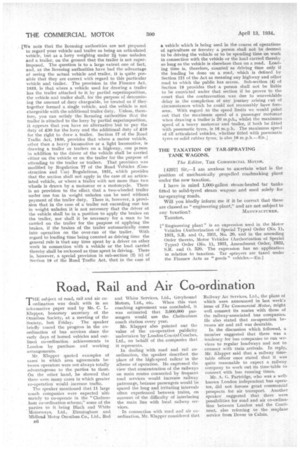Road, Rail and Air Co-ordination
Page 46

If you've noticed an error in this article please click here to report it so we can fix it.
THE subject of road, rail and air coordination was dealt with in an informative paper read by Mr. C. L. Klapper, honorary secretary of the Omnibus Society, at a meeting of the Society, last Friday. The speaker briefly traced the progress in the coordination of bus services since the early days of horsed vehicles and outlined co-ordination achievements in London by purchase and working arra ngements.
Mr. Klapper quoted examples of cases in which area agreements between operators were not always totally advantageous to the parties to them. On the other hand, he showed that there were many cases in which greater co-operation' would increase traffic.
The speaker mentioned that 11 large coach companies were expected ultimately to co-operate in the "Cheltenham co-ordination scheme," some of the , parties to it being Black and White Motorways, Ltd., Birmingham and Midland Motor Omnibus Co., Ltd., Red B6 and White Services, Ltd., Greyhound Motors, Ltd., etc. When. this vast coaching agreement was concluded, it was estimated that 3,000,000 passengers would use the Cheltenham coach station every year.
Mr. Klapper also pointed oat the value of the co-operative publicity undertaken by London Coastal Coaches, Ltd., on behalf of the companies that it represents.
In dealing with road and rail coordinations, the speaker described the place of the high-speed railcar in the seheme of operation. He expressed the view that concentration of the railways on main routes connected by frequent road services would increase railway patronage, because passengers would be spared the long and irritating intervals often experienced between trains, on account of the difficulty of interlacing the main line with local railway services.
In connection with road and air coordination, Mr. 'Mapper considered that
Railway Air Services, Ltd., the plans ot which were announced in last week's issue of The Commercial Motor, might well connect its routes with those of the railway-associated bus companies. He also stated that co-operation between air and rail was desirable.
In the discussion which followed, a niemher suggested that there was a tendency for bus companies to run services to regular headways and not to connect with train arrivals. In reply, Mr. Klapper said that a railway timetable officer once stated that it was quite reasonable to expect a railway company to work out its time-table to connect with bus running times.
Mr. A. G. Partridge, who was a wellknown London independent bus operator, did not foresee great commercial prospects for air transport. Another speaker suggested that there were possibilities for road and air co-ordination between London -and the Continent, also referring to the seaplane service from Dover to Calais.


























































































